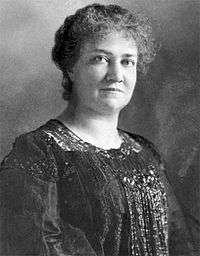Rosa Mayreder
Rosa Mayreder (30 November 1858 in Vienna – 19 January 1938 in Vienna) was an Austrian freethinker, author, painter, musician and feminist. She was the daughter of Franz Arnold Obermayer, a wealthy restaurant operator and barkeeper, and his second wife Marie.
Rosa had 12 brothers and sisters and although her conservative father did not believe in the formal education of girls he allowed her to participate in the Greek and Latin lessons of one of her brothers. She also received private instruction in French, painting and the piano.
Life and marriage
In 1881 Rosa married the architect Karl Mayreder, who later became rector of the technical university in Vienna. The marriage was harmonious but remained childless. In 1883 Rosa had an abortion and she also had two affairs, which she describes in detail in her diaries. Karl suffered repeated depressions from 1912 until his death in 1935.

In the circle of women's rights campaigner Marie Lang at the Schloss Bellevue in Vienna-Grinzing, Rosa Meyreder met Rudolf Steiner (with whom she entered into a long and extensive correspondence), Hugo Wolf and Friedrich Eckstein. Rosa formed a warm friendship with Wolf and developed one of her stories as the libretto for his opera Der Corregidor, which was first performed in Mannheim in 1896. During these years she published her first novel Aus meiner Jugend (From My Youth). It was also in Lang's circle that Rosa met Marianne Hainisch with whom she worked in the Austrian women's association "Allgemeiner Österreichischer Frauenverein", which was formed in 1902.
Mayreder published two influential works, Zur Kritik der Weiblichkeit (To Critics of Femininity) (1905, published in English as A Survey of the Woman Problem, 1912) and Geschlecht und Kultur (Sex and Culture) (1923). The latter work, which criticised the double standard and discrimination against women, was translated into English. She also published an autobiography, Das Haus in der Landskrongasse.
During the First World War Mayreder engaged in the peace movement and became in 1919 the chairman of the "Internationale Frauenliga für Frieden und Freiheit" (International Women's League for Peace and Liberty, IFFF).
Mayreder was an influence on Swedish literary critic Klara Johanson.
External links
- Rosa Mayreder (German)
- Works by or about Rosa Mayreder in libraries (WorldCat catalog)
|